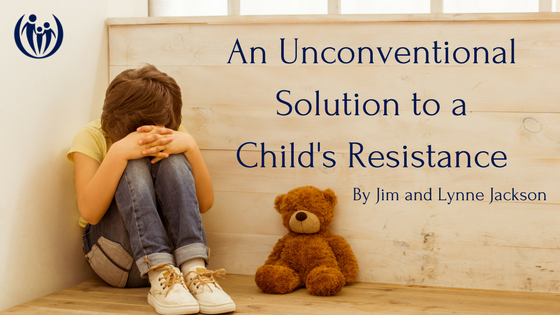
An Unconventional Solution to a Child’s Resistance

We often see a common parenting cycle when kids are prone to anxiety.
In short, it goes like this:
- Child feels anxious
- Worried, but well-meaning parent “encourages” the child toward to overcome the anxiety by pushing the child
- The child gets more anxious and withdraws, or has a meltdown in order to feel in control
- The child feels more ashamed and anxiety builds
- Parents feel scared about the future and the anxious (and usually very emotionally sensitive) child picks up on this and grows even more anxious
- Repeat at increasingly higher intensity
This cycle might be about homework, new experiences, social situations, or any number of challenges.
Recently we received an email from Todd capturing an engaging story of truly helpful encouragement that empowered his child to overcome anxiety. Todd’s approach is rooted in the principles of empathizing and problem-solving, rather than getting tough with an anxious child and trying to force the “right” behavior.
We had company last weekend and I was trying to instruct my sons on the biblical priority of being hospitable and welcoming. They were happy to help me make apple cider for our guests. However, when I asked my oldest, Seth, to go into the living room and ask Mommy and her friends if they would like apple cider or coffee, the fun ground to a halt. Seth is very shy and scared of speaking to less familiar people or feeling “put on the spot.” I immediately noticed his feelings of panic — tears welled up in his eyes as he protested.
This is where most well-meaning parents anxiously get hung up on “requiring obedience” and “pushing kids to succeed.” Todd had been there done that, and so instead he put his new learning about encouragement into practice.
I gently got down at Seth’s eye level. I hugged him and I affirmed his heart of desiring and being willing to serve. Thankfully (and only by God’s grace!) as I sincerely empathized with his feelings I could see that he felt immediately safe and not forced to do what I asked: his eyes stopped welling with tears, he embraced me, and he began to laugh with relief and nervous anticipation rather than tear up in fear.
I remembered that Seth really enjoys problem solving (he loves math too!). So I asked him how he thought we should ask our guests what drinks they wanted.
This is a classic tactic for helping a child feel responsible when that child would otherwise reject or unwillingly comply with “responsibility.” Todd’s question helped Seth to keep feeling the weight of responsibility, but in a way that he could own the outcome instead of feel controlled.
I asked a few more questions, until Seth came up with a creative idea to serve our guests by “delivering” the menu: he drew a mug with steam coming out of it and asked me to write “coffee or apple cider.” Then we folded it into a paper airplane and he flew the note into the room for our guests. Someone came and told Seth the group’s order, and he personally told me how many of which drinks. He helped me bring them in to our guests with a big smile on his face (and our guests were smiling also). Both my wife and I affirmed his creative solution to a fear he faces and how God had blessed him with a heart to serve and show hospitality. Praise God!
Praise God, indeed! Anxious kids that are pressured usually withdraw or resist in order to gain a sense of control and predictability (safety) they need. But God used Todd’s calm and empathetic observations about his son to create the safety Seth needed. From that safe place Seth could problem-solve how to overcome his fear. It was a solution that left everyone smiling!
Apply It Now:
- Think of a situation where you and your child(ren) have butted heads around something they are resistant to or anxious about. What do you think is underneath your child’s resistance?
- Think of 2-3 statements or observations you could make that would communicate to your child, “I really understand what you’re feeling.”
- How could you engage your child’s problem-solving skills to come up with a creative plan to overcome their challenge?
Sign up below to receive a weekly dose of encouragement straight to your inbox:

